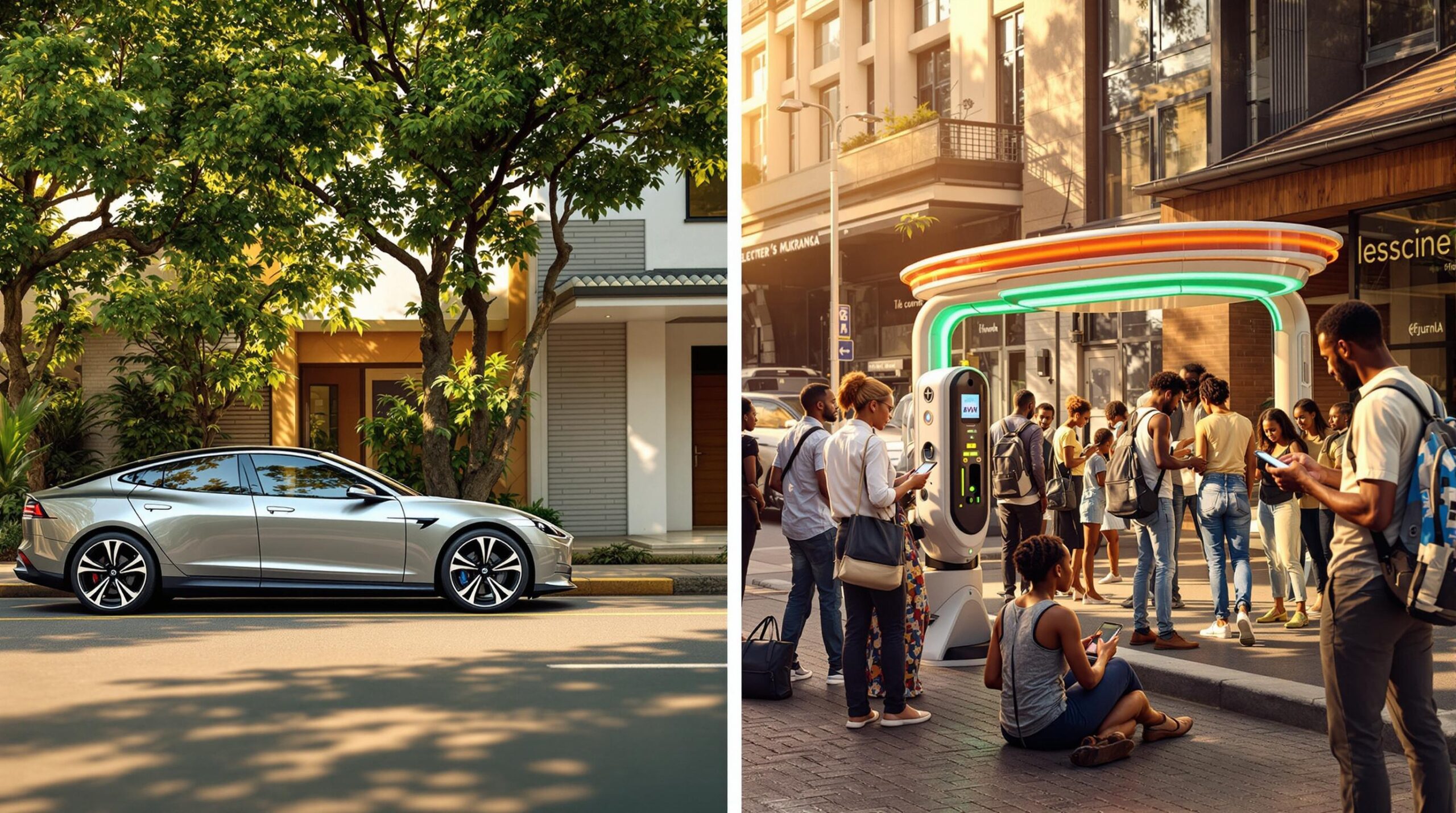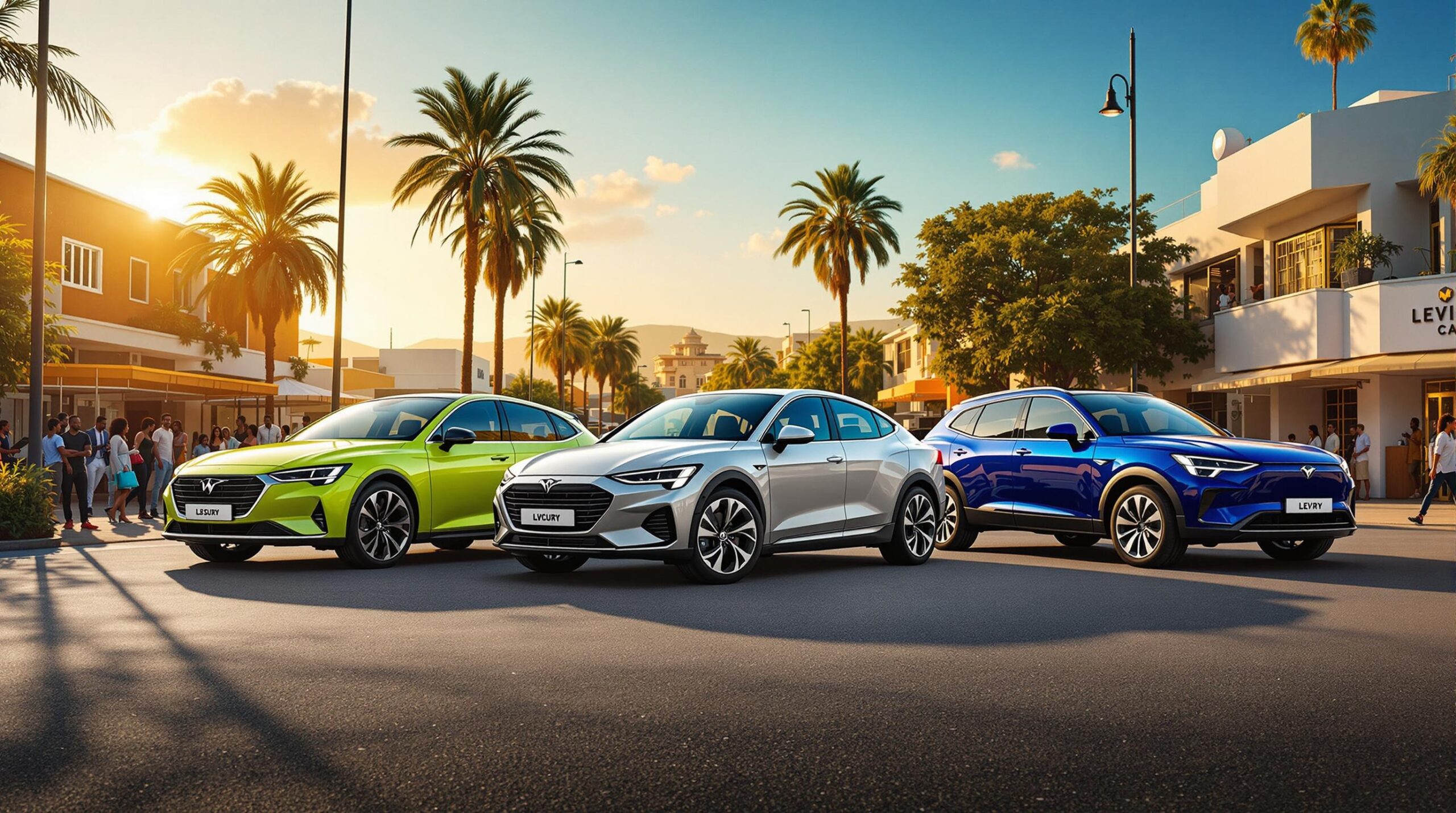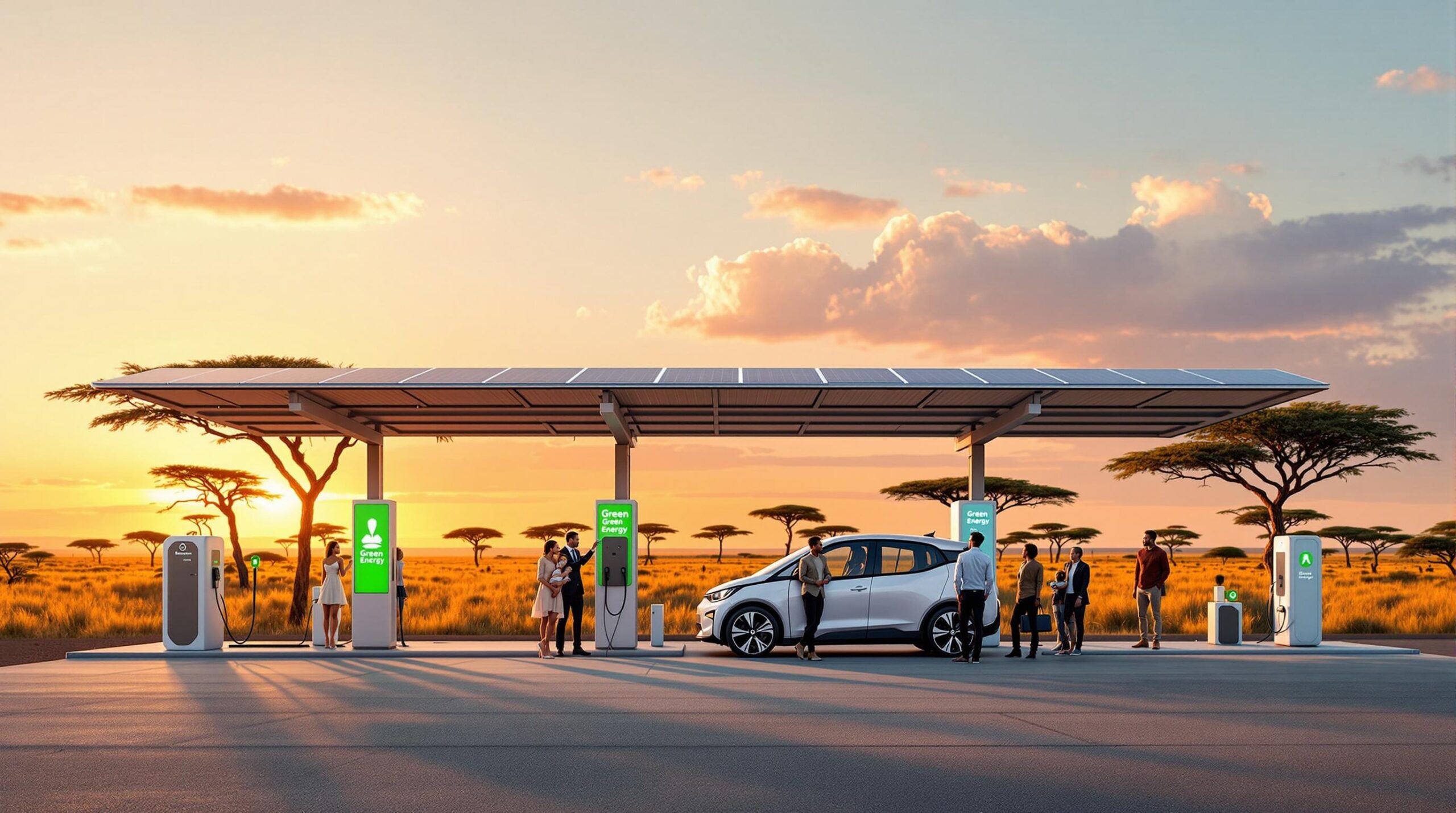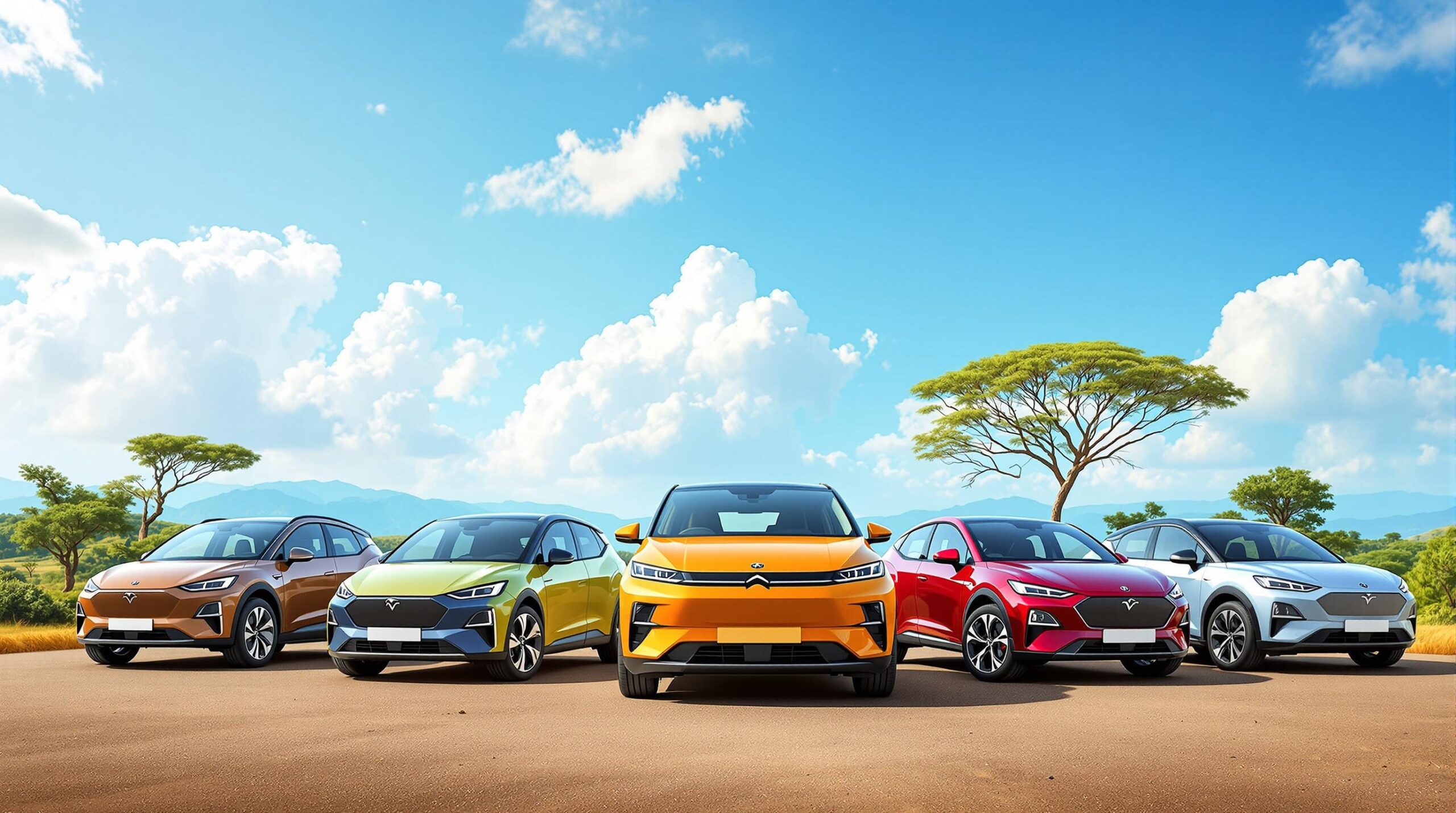
Rwanda and South Africa take very different approaches to electric vehicle (EV) tax policies, which directly impact affordability and market growth.
- Rwanda: No import duties on EVs, batteries, or chargers. EV manufacturers benefit from a reduced 15% corporate tax rate. Example: The GEELY PANDA MINI costs $5,880 with no additional import fees.
- South Africa: A 25% import duty increases EV costs significantly. Manufacturers receive incentives like a 150% tax allowance to boost local production. Example: The same GEELY PANDA MINI costs $7,350 after import duties.
Quick Comparison
| Policy Element | Rwanda | South Africa |
|---|---|---|
| Import Duty | 0% | 25% |
| Manufacturing Incentives | 15% corporate tax rate | 150% tax allowance |
| Entry-Level EV Price | GEELY PANDA MINI: $5,880 | GEELY PANDA MINI: $7,350 |
| Mid-Range EV Price | BYD QIN PLUS EV: $14,180 | BYD QIN PLUS EV: $17,725 |
Rwanda focuses on affordability to encourage EV adoption, while South Africa prioritizes long-term local manufacturing growth despite higher upfront costs for consumers.
The Government of Rwanda has outlined the key provisions of …
EV Import Duty Rules
Rwanda and South Africa have very different policies when it comes to EV import duties. Here’s a closer look at how these rules impact pricing.
Rwanda’s Zero Import Duty Policy
Rwanda does not charge any import duties on EVs, batteries, or charging equipment. For instance, the LEAPMOTOR T03 2024, priced at $9,500, retains the same cost upon import. Similarly, the BYD QIN PLUS EV 100 Kw keeps its base price of $14,180 before local taxes.
South Africa’s 25% Import Duty
In South Africa, a 25% import duty significantly increases the price of EVs. The table below illustrates this impact:
| Vehicle Model | Base Price | Import Duty Added | Final Price |
|---|---|---|---|
| GEELY PANDA MINI BASE | $5,880 | $1,470 | $7,350 |
| DONGFENG FENGON WINDSTAR E380 | $23,300 | $5,825 | $29,125 |
| BYD QIN PLUS EV 100 Kw | $14,180 | $3,545 | $17,725 |
This difference in import duties results in higher prices in South Africa, limiting consumer access to electric vehicles compared to Rwanda.
Local EV Manufacturing Tax Benefits
Tax incentives for local manufacturing play a key role in shaping the electric vehicle (EV) market in different countries.
Rwanda’s 15% Corporate Tax for EV Manufacturers
Rwanda supports EV manufacturers with a reduced corporate tax rate of 15%. The country also leverages Free Trade Zones to encourage local EV production and investment.
South Africa’s Generous Tax Allowances
In South Africa, EV manufacturers benefit from a 150% tax allowance, meaning they can deduct 1.5 times their qualifying capital expenses. Other programs, such as APDP 2 and AIS, further support EV production efforts.
These policies highlight how nations are encouraging domestic EV manufacturing while fostering growth in the electric vehicle industry.
sbb-itb-99e19e3
Tax Policy Effects on EV Sales
Tax policies play a key role in shaping electric vehicle (EV) sales and determining how accessible these vehicles are to consumers.
Rwanda’s Approach to Lowering Costs
Rwanda has eliminated import duties on electric vehicles, significantly cutting down entry costs and making EVs more affordable for a broader audience. For instance, the GEELY PANDA MINI BASE is priced at $5,880, and the LINGBOX UNI at $4,800 – examples of how zero import duties make EVs easier to afford. This policy aligns with Rwanda’s reliance on hydropower, further minimizing overall expenses.
South Africa’s Pricing Obstacles
In contrast, South Africa imposes a 25% import duty on EVs, which drives up prices and limits affordability. Even locally produced models remain less competitive compared to Rwanda’s pricing. For example, South Africa’s 25% duty impacts all EV segments, making entry-level models like the GEELY PANDA MINI significantly more expensive than Rwanda’s sub-$6,000 options.
| Price Category | Rwanda (Zero Duty) | South Africa (25% Duty) |
|---|---|---|
| Entry-Level | GEELY PANDA MINI ($5,880) | Same model + 25% duty |
| Mid-Range | BYD QIN PLUS EV ($14,180 – $17,880) | Same model + 25% duty |
| Premium | VOYAH DREAMER ($97,000) | Same model + 25% duty |
This pricing disparity creates two very different markets. Rwanda prioritizes low upfront costs to encourage EV adoption, while South Africa’s higher prices, despite local manufacturing efforts, make EVs less accessible to the average buyer.
Tax Policy Comparison Table
Policy Comparison Details
Here’s a breakdown of how EV tax policies and pricing differ between Rwanda and South Africa:
| Policy Element | Rwanda | South Africa |
|---|---|---|
| Import Duty | 0% on all imported EVs | 25% on imported EVs |
| Manufacturing Incentives | 15% tax rate for EV manufacturers | Incentives for local EV production |
| Entry-Level EV Price Impact | GEELY PANDA MINI: $5,880 (final price) | GEELY PANDA MINI: $7,350 (with duty) |
| Mid-Range EV Price Impact | BYD QIN PLUS EV: $14,180 (final price) | BYD QIN PLUS EV: $17,725 (with duty) |
Rwanda’s zero import duties and 15% flat tax for manufacturers make EVs more affordable. In contrast, South Africa’s 25% import duty increases prices, even with incentives for local production.
Summary and Findings
These tax policies play a key role in shaping EV accessibility and market growth in different ways. Rwanda emphasizes keeping EVs affordable for consumers, while South Africa prioritizes developing a local EV manufacturing industry. For example, Rwanda’s zero import duty allows for lower prices, such as the GEELY PANDA MINI costing $5,880, making EVs easier for consumers to purchase.
On the other hand, South Africa’s approach leans on long-term production incentives, but its 25% import duty creates a short-term hurdle for affordability. This strategy highlights a focus on building industrial capacity at the expense of immediate market access. While lower import duties provide quicker benefits to consumers, production incentives aim to foster long-term industry growth. This comparison highlights how specific tax policies can encourage both faster adoption and sustained industry development across Africa.




